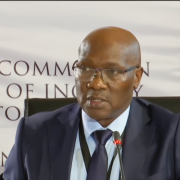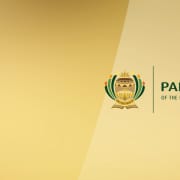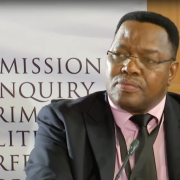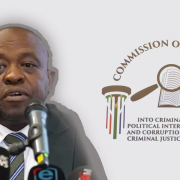|
Getting your Trinity Audio player ready...
|
“A healthy criminal justice system is key to the rule of law and in turn, to a functioning constitutional democracy. With a criminal justice system that is populated by malleable and corrupt functionaries, many criminals, especially those holding positions of influence will rarely, if ever answer for their criminal deeds.”
These are the words of retired acting Deputy Chief Justice Mbuyiseli Madlanga, who is chairing the Commission of Inquiry into Criminality, Political Interference, and Corruption in the Criminal Justice System – informally known as the Madlanga Commission. The commission started its hearings today, and Madlanga was addressing the in-person and online audience by way of an introduction.
It exists because of allegations, made on 6 July 2025 by KwaZulu-Natal (KZN) police commissioner Lieutenant-General Nhlanhla Mkhwanazi, that South Africa’s criminal justice system was compromised because of the infiltration of criminal syndicates into police, judicial, parliamentary, political, intelligence, and law enforcement structures.
As a result of these alarming allegations, President Cyril Ramaphosa established the commission to investigate and report on the veracity, scope, and extent of the allegations. It is mandated to scrutinise the operations of the South African Police Service (Saps), the KZN political killings task team (PKTT), crime intelligence, the National Prosecuting Authority, the State Security Agency, the judiciary, the Department of Correctional Services, and any other institution within the criminal justice system. The Johannesburg, Ekurhuleni, and Tshwane metro police departments will also come under scrutiny, as well as Cabinet.
“If you subvert the criminal justice system, you subvert the rule of law and constitutional democracy itself,” said Madlanga. “The subversion of the criminal justice system may take any number of forms – without purporting to be exhaustive, it may come as downright intimidation, it may consist in improper promises or inducements, it may take the form of corruptly influencing the decision making or functioning of those responsible for the smooth running of the system.”
All these forms and others are a cancer to what a proper criminal justice system should be, said Madlanga.
Three phases
The commission will move through three phases during its sitting, said chief evidence leader Adv Terry Motau in his opening address. Phase 1 involves the hearing of Mkhwanazi’s testimony, during which he will be expected to explain his allegations in full and present any evidence he has, in the form of documents, communications, or reports, among others, to establish the veracity of his allegations. Mkhwanazi will also be expected to name the individuals and institutions that are involved.
This phase will also see other witnesses testifying, including National Police Commissioner Fannie Masemola as the person to whom Mkhwanazi reports, members of the PKTT, detectives involved in the investigations, and prosecutors and other various experts.
In phase 2, the committee will rigorously test the evidence, and where applicable, said Motau, “assess rebuttals to the allegations presented in phase 1, and in this phase 2, that is, individuals and institutional representatives implicated by Lieutenant-General Mkhwanazi in his statement and his evidence … persons such as the suspended minister of police will be invited, or if necessary, compelled, to come and appear before the commission and provide testimony”.
This phase is dedicated to objectively examining the allegations, Motau continued, and allowing those named a fair opportunity to offer their explanation and to refute the claims made against them. Each will be called upon to address the specific matters relevant to their conduct, after which the commission will evaluate the evidence. Cross-examination will also be allowed in this phase.
The third and final phase will see Mkhwanazi recalled to the stand, along with other key witnesses who will have to address the perspectives and counter-allegations presented by those implicated during the preceding phases. “This phase will provide General Mkhwanazi with an opportunity to respond directly to any conflict in accounts, clarifying points of contentions, when necessary, and offer additional evidence or context.”
This will allow Mkhwanazi’s credibility to be tested against that of the implicated individuals.
Testimony
He is scheduled to testify for a likely five consecutive days, which will impact his appearance date before the recently established parliamentary ad hoc committee, also set up in July to probe Mkhwanazi’s allegations. The ad hoc committee is determined to have Mkhwanazi as its first witness, saying that ‘reasonable measures’ should be taken to secure his appearance before 22 September, to prevent delays. Committee members believe his testimony must be prioritised, even mooting the issuing of a summons, should the provincial commissioner remain unavailable.
Back at the Madlanga commission, evidence leader Adv Mahlape Sello, assisted by evidence leader Ofentse Mohlasedi, took Mkhwanazi through the first day’s testimony, which was based on his 100-page statement to the commission. After Mkhwanazi elaborated on his police career, he took some time to explain the constitutional and legal duties and responsibilities of the police service and minister, and the structure of police ranks and forms of address of officers.
Led by Sello, he then moved to the PKTT, providing details of the reason and timeframe for the unit’s establishment.
“We know that the province of KwaZulu-Natal historically has been a problematic province with regard to political violence, which dates back to the days before democratic South Africa, and that problem remained,” he said. “Although it had subsided prior to the establishment of this team, it started rising again, and we started seeing the leaders of our country being attacked at different levels, which then necessitated an intervention from the SAPS and the executive.”
He mentioned the Moerane Commission, established in 2016 to investigate political murders in the province, as one of the factors behind the PKTT’s establishment.
“The Moerane commission did confirm that these many assassinations were linked largely to corruption within local government, especially tenders.”
Further testimony covered operational details such as strategy, funding, and budget, and then went on to the disbandment of the PKTT, with Mkhwanazi expressing his disagreement with currently suspended police minister Senzo Mchunu’s view that the unit was not bringing any value to police operations in the province, and that it was in fact successful. He added that he feels that Mchunu may have been influenced in making the decision.
The day’s sitting adjourned at 16h14.
Criminality, political interference, and corruption in criminal justice
Ramaphosa established the “Judicial Commission of Inquiry into criminality, political interference, and corruption in the Criminal Justice System arising from the specific allegations made public by [KwaZulu-Natal police commissioner] Lieutenant-General Nhlanhla Mkhwanazi on 6 July 2025, with the terms of reference in the Schedule attached hereto”.
The commission is mandated to inquire into Mkhwanazi’s allegations that a sophisticated criminal syndicate has infiltrated law enforcement and intelligence structures in South Africa, including the South African Police Service (Saps), the National Prosecuting Authority, the judiciary, various metro police departments, and the Department of Correctional Services, among others.
Mkhwanazi also alleged that Police Minister Senzo Mchunu interfered with sensitive police investigations and colluded with business people, including a murder accused, to disband the KZN PKTT. He further alleged that a police investigation by the task team in Gauteng unmasked a syndicate controlled by a drug cartel, which involves politicians, law enforcement officials from the Saps, metro police, and correctional services, prosecutors and the judiciary, and business people.
Madlanga is presiding over the hearings, with senior counsels Sesi Baloyi and Sandile Khumalo assisting. Respected academic and higher education expert Dr Nolitha Vukuza is the commission’s secretary, and Jeremy Michaels is the spokesperson. Forensic auditor Dr Peter Goss is the chief investigator. Chief evidence leader is Adv Terry Motau, assisted by advocates Matthew Chaskalson, Mahlape Sello, Adila Hassim (a former CW board member), Lee Segeels-Ncube, Ofentse Mohlasedi, and Thabang Pooe.
Ramaphosa gazetted the terms of reference on 23 July 2025. The commission’s terms of reference stipulate that an interim report must be produced and handed to Ramaphosa within three months.
“These allegations, if proven true, threaten to undermine the confidence of South Africans in the ability of the South African Police Service to protect them and to effectively fight crime and corruption,” said Ramaphosa in an address to the nation on 13 July.






